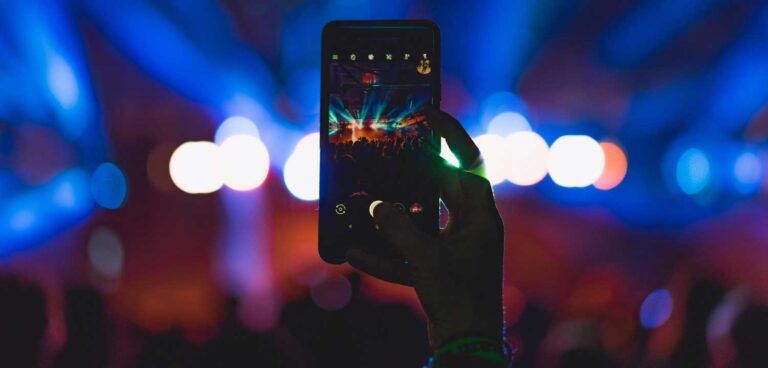Mobile devices offer today’s consumers a multitude of services at their fingertips. From a live music perspective, mobile ticketing (m-tickets) is a convenience that at least one third of gig-goers have adopted. Catering to both impulse buying and instant purchasing, m-tickets are faster and more efficient than waiting weeks for a paper ticket to arrive in the post. They also offer the ability to provide an array of digital services and personal recommendations from within the app in which they are stored.
Although mobile apps are a great way to communicate with customers – and are frequently used in the retail and transport sectors – this direct and immediate channel has yet to reach its full potential when it comes to communicating with music fans. In the live events space, the advantages of mobile tickets extend way beyond the initial point of purchase.
With an effective marketing strategy in place, a mobile device can become a powerful digital platform, enabling events operators to generate more revenue, not only during the event but also before and after. So far, the concept of an entirely connected concert experience has not been fully realized, and the time is ripe for music events businesses to seize the opportunity to create a dynamic venue-wide ecosystem that is fully supported by a robust mobile technology platform.
New revenue streams
Integrating an m-ticketing app as a communication channel in the marketing mix has the capacity not only to enhance relationships with fans and boost revenue through increased engagement, but also to create new ticketing opportunities and business models for venues and artists alike. With improved control over ticketing, new avenues can be explored, such as creating subscription models, which dominate other areas of entertainment and music consumption.
Mobile platforms can be used by fans to purchase merchandise ahead of the show or to offer VIP access for an additional fee – all paid and dealt with instantly through the app. The potential for cross-selling via mobile technology is boundless. Imagine being at a Justin Bieber concert where he sings a new rendition of a song, arranged just for that show. With m-ticketing, fans in the audience – maybe those with VIP tickets – can receive that version of the song, as exclusive content and a special memento, at the end of the gig.
Real-time data from mobile apps can also be used to map consumer behavior and help with crowd control and safety. An event operator can monitor and manage crowd levels, adapting queues in the building and adjusting staffing levels. If a queue for one retail outlet is becoming unmanageable but at a different location in the stadium the same retailer has no queue, the venue operator can encourage people to move across to the empty location by informing them where it is, that it’s not busy, and by rewarding them with the offer of a discount when they get there.
Although promotional offers are a great way to help drive increased profits for merchandise and hospitality providers in a venue, the most important value that m-tickets provide is an improved service to consumers. From sending real-time information that could potentially impact them on the day of the event, to optimizing their experience from end to end with tailored engagement offerings, m-tickets and apps are all about providing a personalized service for fans in the audience that will enhance their experience and encourage repeat custom.
Preventing ghosting and ticket touting
In addition to enhancing the concert experience, m-tickets and payment apps enable important transactional security benefits. Account-based m-ticketing means individual tickets are locked to the particular device used, which prevents duplication and enables operators to monitor and track all ticket activations through a digital trail, gaining visibility across the whole ticket journey. This visibility helps prevent ghosting, which happens when event organizers know nothing about a person at a gig – the so-called ‘ghost’. This invisibility is a barrier to being able to deliver customer services through the mobile app, but with m-ticketing, if one person buys four tickets and gifts three of them to friends, those tickets must be allocated names and contact details via the online account. All four tickets now belong to known people, not ghosts.
Another area where m-ticketing puts events organizers back in control is ticket touting and the secondary market, a common practice that preys on fans and one of the major challenges faced by the music industry. Traditionally the lack of control over a ticket, once it had been distributed, allowed fraudsters to take advantage and resell tickets illegally at inflated prices. M-tickets virtually eliminate this problem.
A joined-up experience
M-ticketing has the potential to make an experience truly standout. Take a scenario where a consumer is visiting a European city for the weekend. They search on their phone to see which acts are performing, book their tickets via the mobile app, receive notifications as to when the doors open, pre-purchase a band t-shirt and even rely on the app to notify them of shuttle buses or trams and local travel recommendations. And it doesn’t stop there, as even more useful information can be delivered over the app channel, both in and out of the venue. Notifications can be sent counting down to the show, helping to build excitement. Real-time alerts about which entrance to use based on where the crowds are, help to reduce congestion. This is a joined-up ability that offers an intuitive, omni-channel experience extending way beyond the actual concert.
The ways in which we consume music are constantly evolving, and while live concerts have historically maintained a similar format, now is the time for stadium owners and event organizers alike to acknowledge the benefits available from harnessing mobile technology. By integrating these capabilities at live music events, music venue operators avoid the risk of being one digital footprint behind their competitors.






